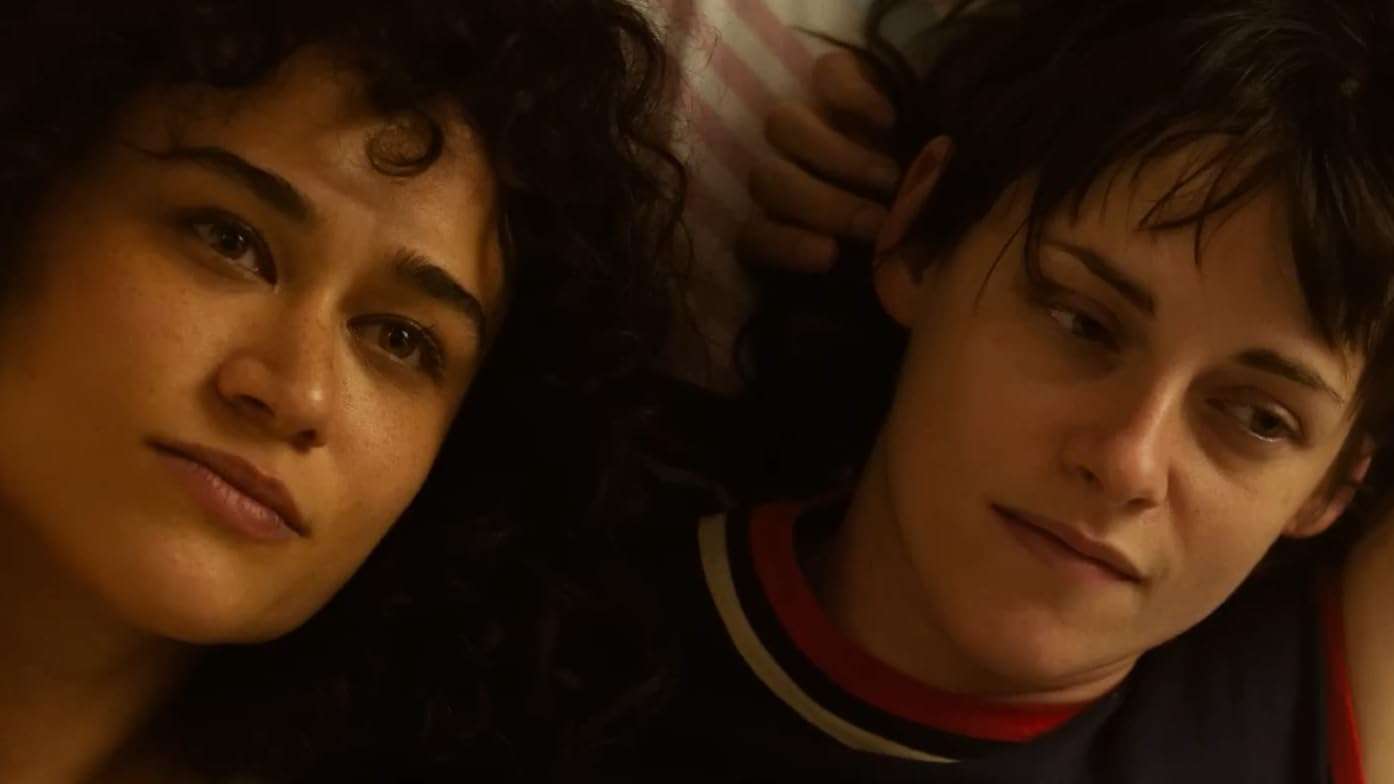Love Lies Bleeding (2024) Movie Review: Few viewers, if any, could attest with absolute honesty to have correctly predicted the trajectory of Rose Glass’s career from her first film to her second. Following up a restrained, squeamish horror slow burn like “Saint Maud” with a bulked-up, neo-noir lesbian love story? Somebody must’ve had that on their bingo card, but it surely wasn’t a widespread notion that the next potential Ari Aster would jump straight from “Hereditary” to “Beau Is Afraid.
Below the surface, however, “Love Lies Bleeding” points to a unique but not at all unconscionable move outside the terrors of religious fanaticism. The soul is, some might say, just another muscle to be torn and built up again, so who’s to say that Glass can’t tackle similar themes of repression, strained human connection, and the frantic search for purpose in a shiny new coat of sweaty, neon-drenched paint?
Lou (Kristen Stewart) runs a gym in a small, dusty town somewhere just a day’s drive away from Las Vegas. Population: however many names can be fit into the opening credits before the film’s title drops. Suffice it to say, it’s a small community where everyone seems to have some sort of connection with one another, which becomes all the more apparent when a young bodybuilder named Jackie (Katie O’Brian in a star-making, muscle-popping turn) hitchhikes onto the scene.
Jackie is a wayward soul with nowhere—or, more accurately, anywhere—to go, but for the time being, she winds up shacking with Lou, whose own lack of direction is emphasized in the time-honored adage that something beneath the surface is keeping her tied to the one place she’s ever known. The two become locked in a steamy romance that begins to cause trouble, particularly with Lou’s abusive brother-in-law, J.J. (Dave Franco), and his boss, her shady, gun-loving father, Lou Sr. (Ed Harris).
This is a fairly broad description of “Love Lies Bleeding,” for Glass, in only her sophomore film, crafts an entirely unexpected and engaging thriller that crisscrosses so much between its small cast that it makes this six-person troupe feel as though we’ve spent years in their dingy, tattered clothes. The film’s breathless narrative and frequent stabs at dark humor don’t place it too far outside the orbit of a classic Coen brothers feature—in fact, it would be tempting to describe this meeting of wild chicanery and vivacious vaporwave aesthetics as “Drive-Away Dolls” meet “Drive”… full-stop. There is, however, more to these journeys than that.

What these leads possess in their innate propulsion to cement their relationships with one another is precisely what they lack in the motivation to confront their traumas in any meaningful way. The body, therefore, becomes a potent if obvious symbol for the endless push for something enticing, something sexy, something that’s always just out of reach; channel that motivation into a pump of iron or a thrust between the sheets, so long as your focus is on the body in front of you rather than those you’ve left behind.
Though Glass focuses on those bodies as a thematic anchor—and doesn’t fully shy away from focusing her camera on them, either—her concentration as a storyteller is clearly on developing these women through their almost instinctive attraction and protective drive towards each other. Stewart, in that vein, finds yet another vehicle that perfectly attunes itself to her famously fidgety demeanor.
The best of Stewart’s performances tend to come from those filmmakers who understand that this aspect of the actor’s essence is something to be channeled rather than repressed; it’s what made her best performance in “Spencer” so captivating in its grasp of suffocating imprisonment, it’s what made Stewart the only remotely interesting part of Cronenberg’s “Crimes of the Future,” and now, Glass too has found a space to turn that apprehensive aura into a playground for physical and emotional reticence rubbing up against a confrontational swagger.
O’Brian, for most audiences, has no established persona to build on, making her domineering performance just as much a product of her fierce will as her chiseled traps. More to the point, the relative newcomer sells the same sort of apprehension as her costar in her impulsiveness towards confrontation, more often than not leaving her walking smack into a brick wall when someone bigger (or smarter) than her is on the receiving end of her fury. Together, the two leads truly sell the notion that their similar weaknesses coalesce into greater combined confidence, but one that doesn’t necessarily result in the most desirable outcomes for either of their personal journeys.
Rose Glass makes the nuance of this twisting path unmistakably clear in the film’s final moments, preempted by a particular creative choice sure to leave some scratching their heads if taken at face value. And while this decision may come out of nowhere narratively, from a more abstract emotional perspective, the interpersonal dynamics and perceptions of self are made entirely clear in this sudden (but somehow anticipated through hints dropped across the film) dip towards the peculiar. “Love Lies Bleeding” may leave you feeling somewhat saggy towards the middle, but like any good workout, Glass trudges on with that last kick of adrenaline to push you to the finish line until every muscle aches with satisfaction.



![Mangrove [2020]: ‘BFI-LFF’ Review – A poignant and overlooked account directed with style](http://www.highonfilms.com/wp-content/uploads/2020/10/Mangrove-2-highonfilms-768x479.png)




![Loktak Lairembee [2016] MUBI Review – A Poignant, Poetic Tale from the Floating Islands in Loktak Lake](http://www.highonfilms.com/wp-content/uploads/2021/10/Loktak-Lairembee-2016-Review-768x384.jpg)